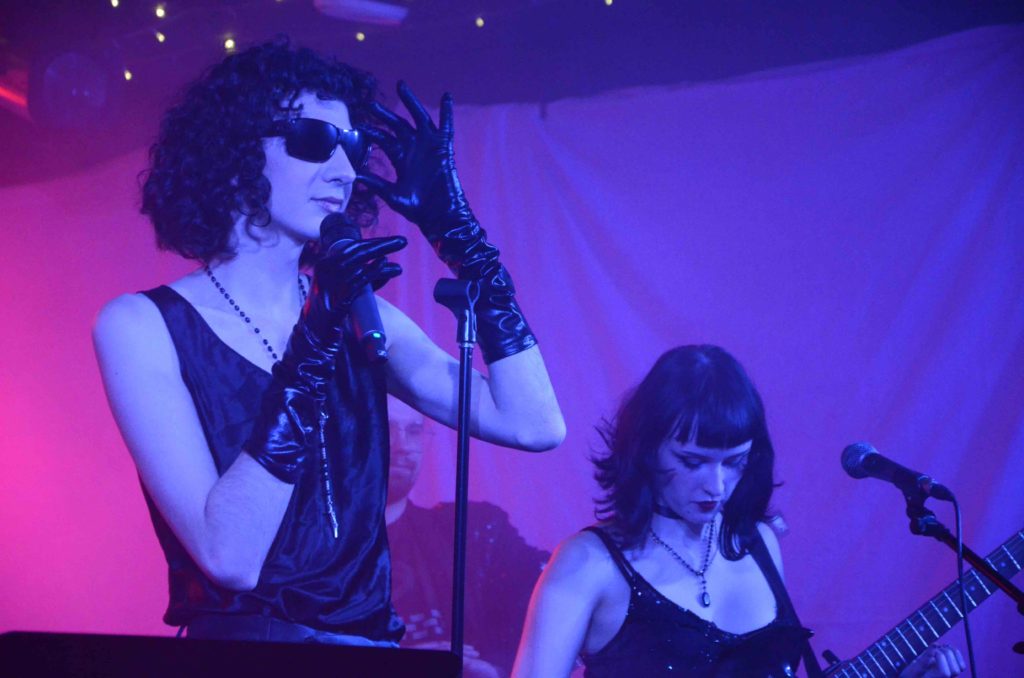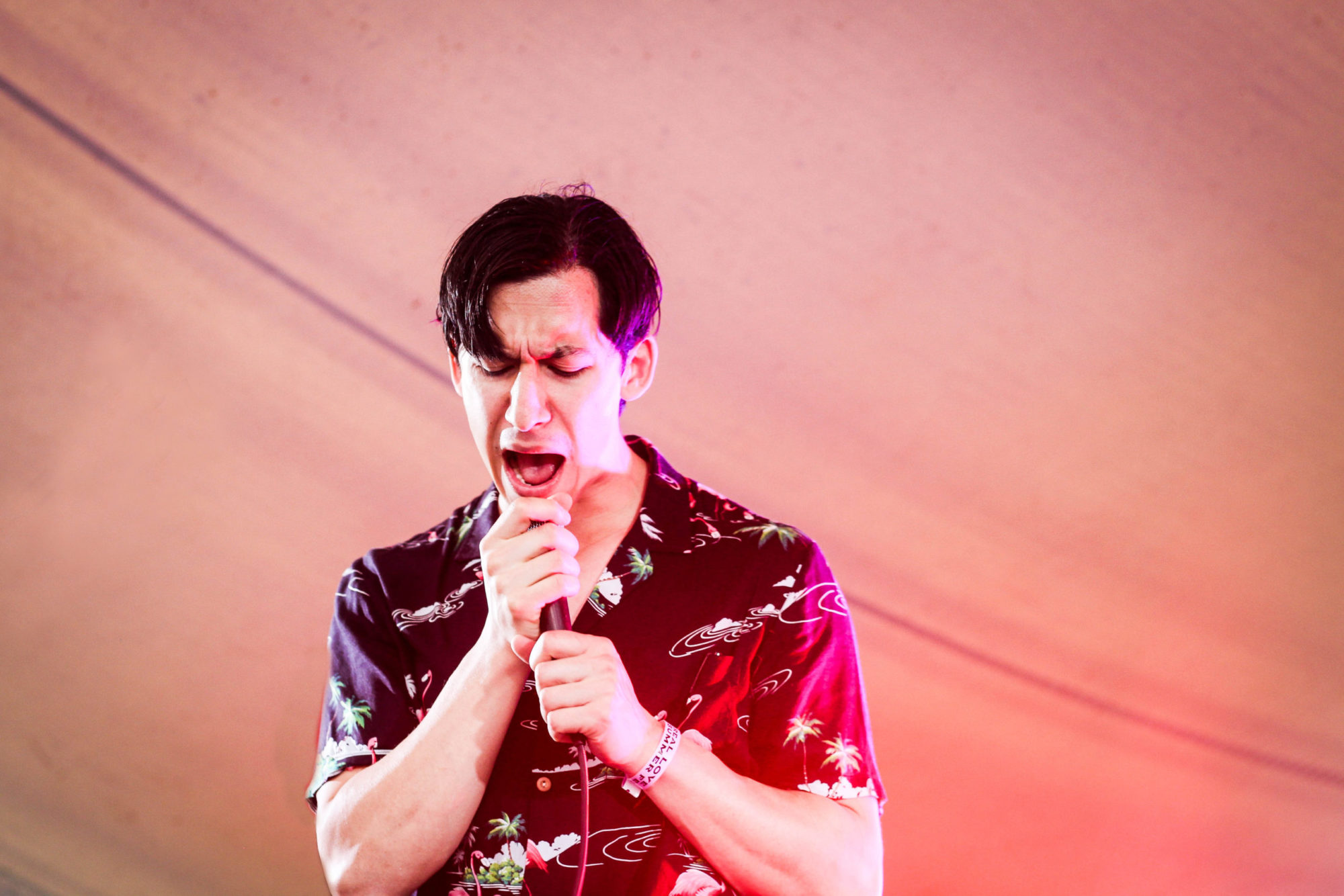
by Rish Hanco
Carlo Capobianco, one of Winnipeg’s newest quickly rising stars, sat down with Stylus to talk about the upcoming album Pray To You. Carlo shares the story of the album, of an underlying sense of God present in his art and life, and of the toxic, one-sided love that inspired each song.
STYLUS: I’m curious about the use of religious imagery; where does that come from?
CARLO: I feel like I’ve always had a weird relationship with God because of my upbringing in a Catholic household. It wasn’t like we went to church every Sunday, but it was still an Italian household, a very old-school immigrant family. Super archaic views on what women do, what men do, and in that there wasn’t really space for somebody like me, who’s androgynous, who doesn’t really care, you know, if I want to wear fishnets underneath my pants, or wear makeup, or play with barbies. I just didn’t care as a child, and so I kind of rebelled a lot. It was just a very constricting space to be in, and I feel like that went through my music. I’ve always felt connected to God. Even if I wasn’t Catholic, I always felt some sort of presence in my life, kind of like a low hum that’s just there, just kind of guiding me in the right places. There’s a lot of imagery in Catholicism, like Adam and Eve, praying, and what’s good, what’s bad. I kind of like that because I’m very black and white in my life, but when it comes to music and when it comes to religion—or spirit, whatever you want to call it—it’s blended. One day I’m Catholic, and one day I’m not, and it’s hard to explain, but I feel like once you’re Catholic, you’ll always be Catholic. I feel like a sinner most of the time the way that I live my life. I wanted to kind of play with that on the album because life is not that serious, and it’s not a big deal. I feel like it’s a conversation between me and God. And between me and myself.
S: I’m kind of gathering this from what you’re saying, but do you feel your Catholic identity conflicts with your sexual identity or the way you feel you are in your day-to-day life?
C: I feel like it conflicts if you look at it from the perspective of someone following Catholicism. I feel like God loves everyone. Even though he says if you sleep with another man, you’re going to hell or whatever. If that were the case, I mean conservative people would be so careful about what they say to their neighbour because … why would you tear down a neighbour? Or judge a neighbour? Or steal from someone or whatever if it’s against God’s rule? I mean, it applies to the same principles. It’s not a level of sin that we follow, they’re all sins, and they all resolve in the same way; you go to hell, or you have to pay for it, or whatever.
S: What’s your favourite track on the album?
C: I think my favourite to write was “Sleeping With the Enemy” because it was so easy to write, and the melody came to me quickly. It’s just a really to-the-point song that seems simple, but there’s a lot behind it if you really dig deep into the lyrics. If you can understand poetry in general, then you can understand that it means I’m sleeping with someone that’s not good for me. But I want to keep doing it because it feels good. I love how catchy it is, and I think that’s my favourite song I’ve ever written, honestly.
S: Does your relationship with your parents ever influence your music writing at all?
C: I think about my dad a lot because when he was younger, he wanted to be a dancer. He wanted to be a ballet dancer, and he’s vehemently homophobic now, but he was into dance, he was into singing. He was into being on stage, and he was into being a star but his mom, my grandma, didn’t want him to be that. So he ended up working at my grandma’s auto shop for the rest of his life, kind of stuck with his mom. The 70s was a different time to be alive, and I’m sure it was a lot harder for him to express himself back then. I feel like I’m almost, in a way, with this album, I’m breaking maybe a generational curse that was in place for him and for my family in general. I’m kind of like breaking the glass ceiling.
S: Where does your love of the 80s come from, and how does that influence your music?
C: When I was younger, I listened to a lot of modern pop, like Pussycat Dolls, Britney Spears, Avril Lavigne, and that kind of thing. In the middle of high school, I stumbled upon some Madonna songs, Prince, and Michael Jackson, the Eurythmics and Simple Minds, and I just loved that everything sounded grand in the 80s. The songs sounded like movie songs. All the synthesizers and drums, all the little tidbits that they put into the production, made me love the 80s and pop music in general. I wanted to create the sound of grand, big pop singles that were explosive and stuck around for years. I feel like I maybe had a different life in the 80s, something like that, because I’m so connected to it, and it doesn’t really have a single starting point. I feel sad when I listen to 80s music or something. I feel like I was there, or I feel like some part of me is connected to the movies or the shows or the singles or the albums or the concerts. I always feel almost like I was there, like I was watching it, and it’s a memory.
S: Did you have any particular musical influences for this album or just in general?
C: I think definitely Madonna, Lana Del Ray, and Joni Mitchell. I love Joni Mitchell’s writing; she’s a wonderful writer. Prince, Michael Jackson. I had songs that inspired the album, but I feel like I just came into it and said I want to make an album that sounds like the 80s, but I want it to be influenced by modern production. I wanted you to listen to it and not be sure when it was made. Sometimes you’ll hear a song that’s like an 80s song, and it sounds like they bought a sample pack for drums and synths. I wanted it to sound like it was made in the 80s but with modern elements.
S: Is there a name for the album?
C: Pray To You.
S: My next question was going to be what inspired the name. Obviously, the song, but why did you choose that one?
C: I just felt it encapsulated the whole idea of the album. This album is really a prayer to God, but I feel like it’s also a prayer to my past romantic relationships. It’s almost kind of like a little bible that I’ve created that encapsulates the memory of what I felt when I was with that person, how I felt during that time. It’s just my own little bible, that’s what I like to call it, and I just felt Pray To You was a really good name in general.
S: You referred to the album as a sort of bible, something that you get lessons from on how to live your life and something that you learn from. When you listen to these songs, when you look back on what it is that inspired you to write these songs, do you learn anything from them?
C: I think it just reminds me of how vulnerable I was at that point in my life and how much it made me feel like I was under the control of my romantic partner. I felt like this person was so amazing and enigmatic that I had to pray to them—everything I did, texting them incessantly, calling them on the phone—all of that stuff was like my version of praying to them. I was so obsessed that everything I did revolved around making them like me, and after I finished the album, I realized I was so stupid for even feeling like that. Now if they don’t like me, I just move on; that’s life. But I was so obsessed and so full of myself that I felt that if I made an album that might connect with them in a way, unbeknownst, if they even knew it was about them… they know it’s about them, and it’s changed nothing. I don’t feel the same way about them. But it is what it is. I’m glad I wrote the album. I’m glad that the pain inspired me to create something that turned into beauty.
S: You’re putting a lot of emotion into this album. Do you ever feel nervous or scared about putting this much of yourself out into the world for others to observe and have opinions about?C: No. I think that’s an artist’s job. I forgot who said it, but ‘artists are here to disturb the peace’—James Baldwin, ‘artists are here to disturb the peace.’ I feel like that’s just a part of the artist’s job, to express the pain and the beauty and the turmoil. And I don’t really give a fuck what anyone thinks about my music, so I’m going to keep releasing it.

